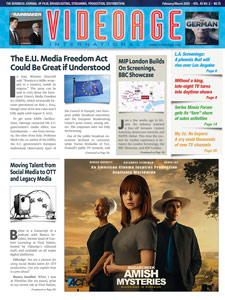Ira Rosen, of 60 Minutes fame, delivers excitement, workplace drama, and political intrigue in Ticking Clock: Behind the Scenes at 60 Minutes (a 336 pg. book from St. Martin’s Press, 2021, U.S. $29.99). While Rosen’s memoir is ostensibly about his time at the CBS News television magazine, he is unsparing in his portrayal of news media in general and the characters it attracts.
Rosen produced story after story for 60 Minutes for nearly 25 years. During his tenure, he worked on newscasts that revealed groundbreaking stories on the U.S. government, corporate malfeasance, mob bosses, and foreign intelligence. In 2019, 60 Minutes’ story on the opioid epidemic, which Rosen contributed to, earned eight awards, including a Peabody and an Emmy. Ticking Clock encompasses it all, from high-intensity news stories to friendships with surprising figures.
A graduate of Cornell University, Rosen started out at 60 Minutes when he was only 26 years old. Before then, he landed a few reporting gigs around the country. Of his chosen career path, he said: “I have always been motivated by trying to expose injustices and felt journalism provided me with the clearest path to do that.”
The book opens with the job offer, the fateful first phone call from Don Hewitt, executive producer of 60 Minutes, and one of two people who would help in shaping Rosen’s professional life. As Rosen tells it, his mother answered and told Hewitt her son already had a job as an on-air correspondent for a monthly news show called What’s Happening, America? “How many jobs do you need?” she quipped. The next day, for the in-person meeting, Rosen met Mike Wallace, one of the original correspondents for the program, who was known for his brash disposition, and for whom Rosen would become the youngest producer at the television magazine.
Working at 60 Minutes was an education in itself. Rosen was surrounded by fabled jour-nalists like Wallace and Harry Reasoner, the original anchors of the program, as well as correspondents Morley Safer and Dan Rather. In addition to the on-air talent, there was a reserve of ambitious producers and cameramen who Rosen recounts tales of. “It was against this backdrop of legends and characters that I tried to establish myself,” Rosen writes. “It was clear that they all played by their own set of rules, rules not taught in journalism school. I needed to figure out how to operate and how to succeed.”
Hewitt and Wallace were a significant influence on Rosen. “These two men gave me a career, a professional life,” he wrote of them. “They were both American originals.”
The two legendary newsmen imparted innumerable lessons on the young producer. Early on in his time at 60 Minutes, Rosen writes, “I began to learn that the most important part of a Mike Wallace story was the confrontation. He had to have someone to hold accountable. Without that someone, the story likely wouldn’t work.”
Hewitt and Wallace left deep impressions on Rosen not only for their dedication to investigative journalism but also for their no-nonsense personalities. Despite his admiration for the men, Rosen presents unflinching character portraits of them, especially of Wallace, whose ruthlessness in the industry even went as far as taking stories and interviews away from his own son, Chris Wallace, a journalist and news anchor who at one time worked for Primetime Live. In one anecdote from Rosen’s time at ABC News, after he left 60 Minutes in 1989, he recounts one particularly telling story. “Mike called and told stand-up comic Chris Rock not to do the show with his son, as 60 Minutes had higher ratings.”
Rosen encapsulates Wallace’s careerism, saying: “He took no prisoners, even if it was a member of his own family.”
Rosen has a lot to say about the work culture in the 60 Minutes newsroom. The floor of the department seemed tense, to say the least. In the book’s telling of it, the workplace environment appears rife with passive-aggressive double-crossing and outright combat. “[A]t any given time, the correspondents wouldn’t be talking with one another,” Rosen writes. “Usually they fought over a story or a producer that had been stolen from them. Mike, of course, given his aggressive nature, was the biggest culprit.”
The big-shot correspondents weren’t the only ones to be competitive. The in-fighting also took place among the producers. In one anecdote, Rosen recalls how a fellow producer accused him of stealing tapes for her story. The same producer “also wrote a letter to Hewitt that the font size of my name on the story jacket, seen in the storyboard behind the correspondent, was bigger than hers, which also wasn’t true,” Rosen insists.
Ticking Clock is chock-full of portraits, some-times admiring and sometimes unflattering, of Rosen’s colleagues and friends. When Rosen worked as a senior producer for ABC News’ Primetime from 1989 to 2004, where his big innovation was introducing hidden cameras into the repertoire, he collaborated with a new set of heavyweights. One of the considerable differences between CBS and ABC was a matter of appearances. “At CBS, a mostly male-dominated news division, looks didn’t matter as much as being a first-rate reporter,” Rosen assesses. “At ABC, looks were important.”
Rosen is equally generous in disclosing juicy tidbits at ABC. Among them, he glosses over an awkward lunch with Jackie O, and the rivalry between Diane Sawyer and Barbara Walters. Of the former, he also says, “Though I loved Diane’s intelligence and commitment to the work, I hated her two-faced qualities. If she was overly friendly and began to kiss you on the cheeks to say hello, chances are she was trashing you behind your back.”
Ticking Clock is undoubtedly entertaining. Rosen spends the latter part of his book with recent events, including the Trump presidency and the #MeToo movement’s impact on CBS. Throughout it all, Rosen shares his path in the world of media with seriousness, hilarity, and bite. Due to his behind-the-camera role among a cast of news media celebrities, Rosen’s story is replete with amusing and shocking revelations.
(By Luis Polanco)
Audio Version (a DV Works service)












Leave A Comment